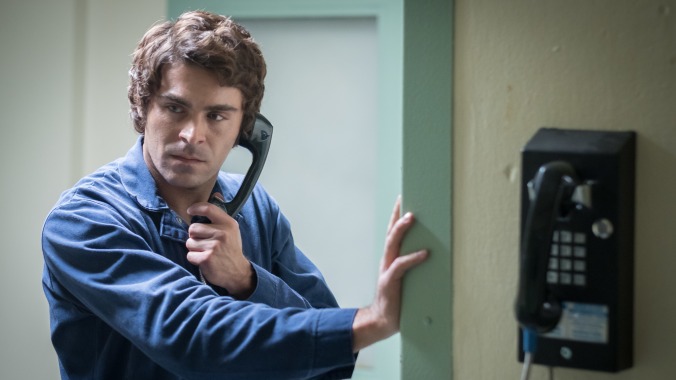Zac Efron's Ted Bundy movie is an interesting, ambitious misfire


You could make a very violent, extreme, sensationalistic movie about Ted Bundy, notorious rapist and serial killer. Extremely Wicked, Shockingly Evil And Vile is not that movie. Named for remarks made by the judge who sentenced Bundy to death in 1979, the film takes a provocatively unintuitive approach to its true-crime material: It doesn’t depict the murders at all, and until its final scenes, actually feigns ignorance about Bundy’s guilt, as though it were still an open question. The intent is to present this human monster not from the certain hindsight of infamy but from something like the vantage of those just learning of what he may have done. Dramatically speaking, it’s a failed thought experiment—you get, watching it, why no one has really told this kind of story in this way. But it’s still hard not to admire the film’s perversely un-perverse strategy, its good-faith attempt to do something more than simply trot out the awful, salacious details.
Bundy is played, in an ingenious bit of stunt casting, by Zac Efron. The one-time High School Musical crooner has broken before with his teen-heartthrob past; the Neighbors films, for example, found comic reservoirs of bitterness and almost sociopathic rage underneath his superhero physique and matinee-idol charisma. With Extremely Wicked, Efron isn’t so much subverting his star power and sex appeal as putting them in a diabolical new context. Bundy, after all, was a ladykiller in more ways than one. He often used his good looks and charm to get his victims alone, and when he was on trial for multiple murders—the nation’s first nationally televised trial, in fact—those same qualities made him an object of public fascination and even desire. In a sense, Efron is hiding, too: You look at him and see his celebrity, not a cold-blooded killer. That’s the whole idea.
Technically, Bundy isn’t the protagonist. That role belongs to Elizabeth Kendall (Lily Collins), the divorced single parent who started dating him in the late 1960s, blissfully ignorant of what he was up to when she wasn’t around. Based on her memoir, The Phantom Prince: My Life With Ted Bundy, Extremely Wicked opens with Kendall visiting Bundy on death row, then flashes back to the night they met at a Washington bar and she brought him home. The film unfolds over a few years and several states, as he becomes the prime suspect in multiple homicide investigations, and eventually a media sensation. Kendall stays with him through his first incarceration, but stops answering his phone calls later on. On the sidelines, her denial melts slowly into horror.
Telling Bundy’s story from her perspective is interesting, especially given who’s doing the telling. Joe Berlinger, who also made the much more comprehensive Netflix documentary on the killer, has found an unlikely personal angle in Michael Werwie’s screenplay and its elisions and gaps in information. The director, remember, spent huge stretches of his career on the Paradise Lost advocacy documentaries, which operated under the conviction that the West Memphis Three were innocent, or at least not guilty beyond a shadow of a doubt. You could call Extremely Wicked a kind of nightmare inversion of those films. In Kendall’s crucible of realization, Berlinger finds his own worst case scenario: What if that imprisoned man—the one insisting upon his innocence, the one you look in the eyes and want to believe—really did it? Is that so different than being with someone for years and not knowing what they really are?
Extremely Wicked chews on a lot, but its power, its drama, remains largely theoretical. Berlinger gets caught in a catch-22. A version of the film with true conceptual integrity would be radically subjective (think: We Need To Talk About Ted), never leaving Kendall’s side, viewing Bundy only through her eyes. But there’s nothing particularly exciting about watching someone sit around crying and smoking and handwringing, glued to the sordid details on their television. So the movie cuts restlessly away to Efron’s Bundy and his headline shenanigans: escaping out the window of a courthouse; bantering with the judge (John Malkovich) during his Florida trial; marrying a different girlfriend, the inordinately trusting and loyal Carol Anne Boone (Kaya Scodelario), on the stand. Powered by yet another loaded jukebox of sub-Scorsese needle drops, these scenes swirl around a character who’s unreadable by design, a cipher concealing his true self from the public but also from the audience.
The mask never slips. Efron keeps it pulled tightly over whatever’s happening in Bundy’s head, helping us understand how someone could fail to recognize the wolf he draped in sheep’s clothing. (The performance is creepy because it never seems to be aiming for “creepy.”) Berlinger, for his part, leaves the mayhem off screen, refusing to show even the briefest glimpse of gruesome handiwork; no one could accuse him of mining real atrocity for cheap, voyeuristic thrills. But by only showing us Bundy’s public face, the tap-dancing charm that made him a tabloid star, Berlinger also risks minimizing the evil of a man who killed at least 30 women and did unspeakable things to their bodies. Ultimately, though, the film’s failure is baked right into its fascinating structural gambit: It depends on the viewer playing dumb and humoring its tunnel vision. That, or somehow not knowing who Ted Bundy is going in. But in that case, what would they be doing watching a movie about Ted Bundy?